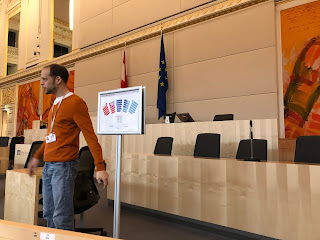The current world climate is greatly focused on global autonomy and cooperation. On a large scale, world politics and events are at the forefront. We can contrast this with our hometown experiences.
Both of us come from small towns. Most of what we hear is surrounding local gossip and politics, instead of what is going on in the world around us.
Being a global citizen means being able to take part and recognize both the struggle and triumph of other cultures. This includes being aware of world events and politics. When traveling abroad, it means understanding, appreciating and taking part in other cultures.
This is extremely evident in language barriers. Almost everyone we have interacted with on this trip has been, at bare minimum, bilingual. These people are able to communicate and understand people from all over the world. It seems that they understand how critical it is to interact with those outside of your own country and culture. Upon observing locals in the cities we've visited so far, we have come to the consensus that these people tend to be more of a global citizen. Most of the time, they seem incredibly knowledgeable about us and where we come from. The language factor is also massive. Almost everyone speaks at least two languages, if not more. They are able to communicate in our language, despite us being in their home.
Being a global citizen means being able to come into a foreign country and understanding that things are not the same as home. It is critical to be able to interact in another culture, leaving self-reference criterion behind, and not being ethnocentric.
Standing back and observing the group, it is interesting to compare to what extent each person is a global citizen. It is evident that some people have an easier time immersing themselves in a new culture. On the other hand, some others struggle to really get these differences. This is not a negative thing. Everyone's experience is different. It is a matter of how we have been brought up, the life experiences we've encountered, and the extent to which every individual understands cultural differences. .
We both feel that we are a global citizens on some level. However, we recognize that we have a long way to go to be true global citizens. Things like being multilingual, being more aware of history, and deeper understanding of culture.
Do you feel that you you've had a hard time adjusting to other cultures? What has been the most difficult part for you? What do you think you can do to be more of a global citizen?
xoxo
EJ
 |
| Even a poor man can dress well and influence the locals ~ Bratislava |
 |
| Budapest on a rainy day |



























